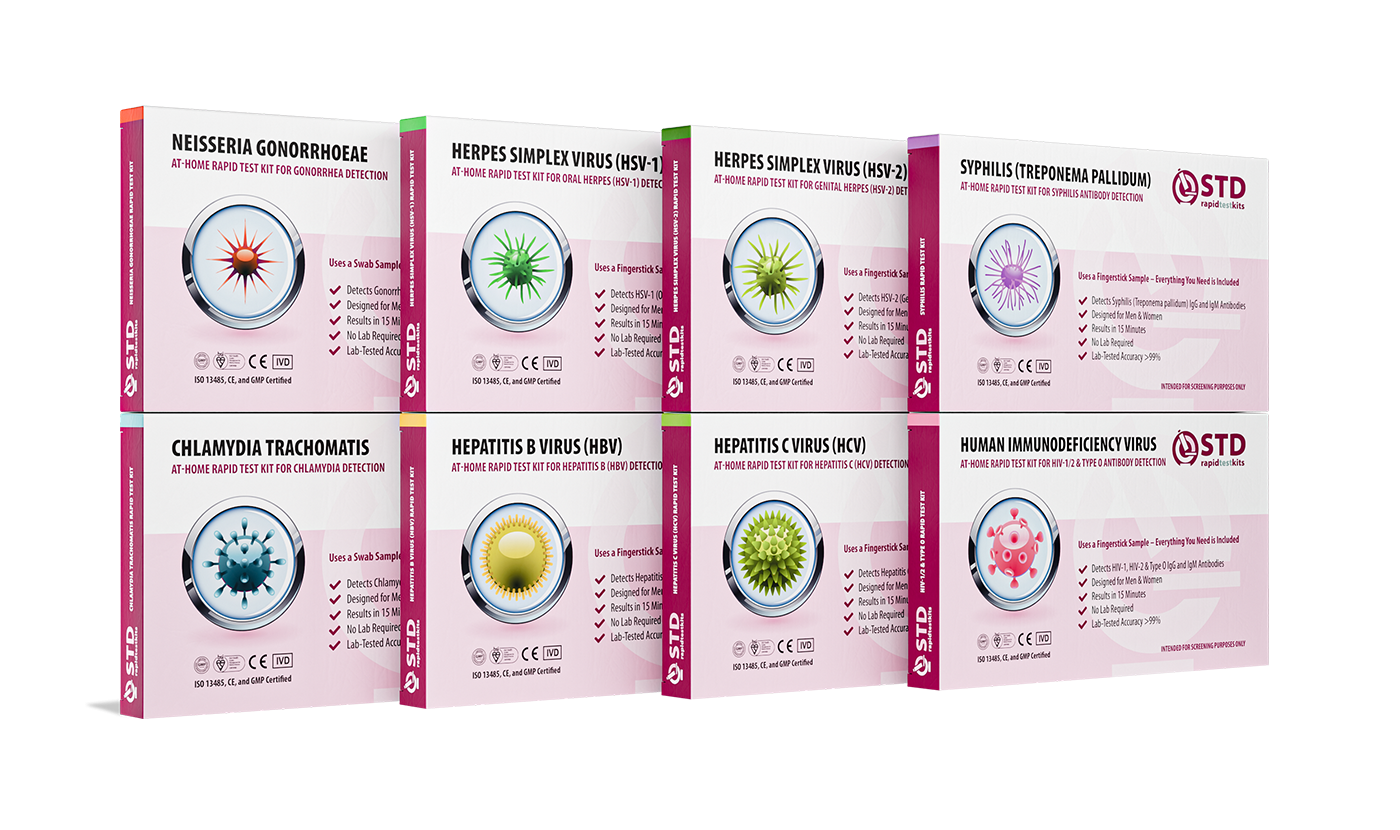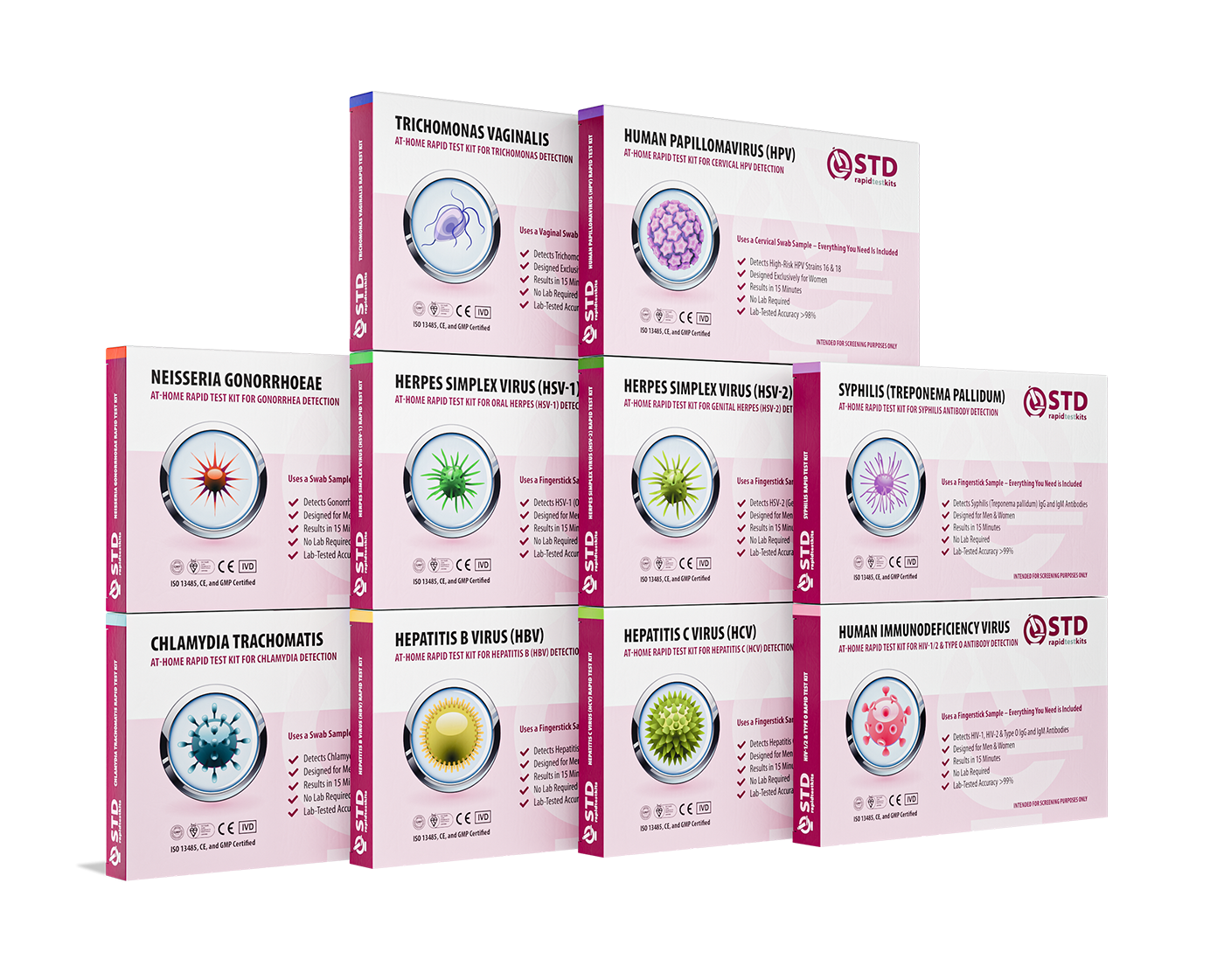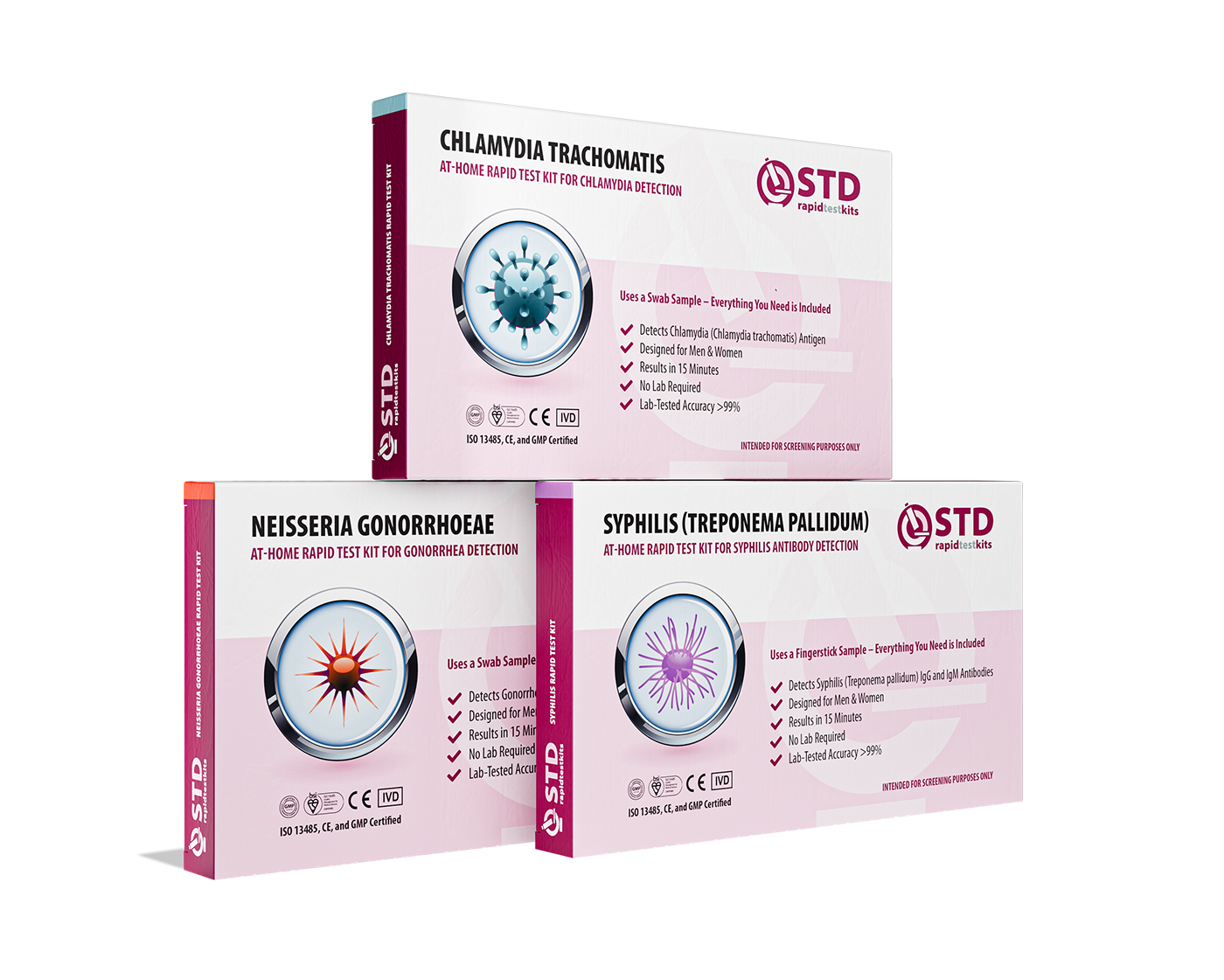The Future of STD Testing: How At-Home Kits Are Changing the Game
Regardless of whether you are pregnant alone or in a monogamous relationship, sexually transmitted infections (STIs), or otherwise known as STDs, can have serious impacts during pregnancy. According to the World Health Organization, over 1 million STIs are acquired every day across the world, and the majority of them are not detected because they do not manifest themselves with symptoms. STDs that are left untreated during pregnancy may result in premature birth, low birth weight, miscarriage, and even passing the infection to the baby at birth
In this article, we will unmask why STD testing during pregnancy is necessary, what diseases are typically tested for, what are the risks and benefits, and what to watch out for when the time arrives for testing. Whether you're having your first child or just want to learn more about your prenatal health, this article is here for you—with real-life facts, statistics, and anecdotes to guide you through.

STDs in Pregnancy: What New Moms Need to Know
Let's get the fundamentals clear: Why in the world do new moms need STD tests during pregnancy?
Sexually transmitted diseases may infect anybody, be they single or married, with or without symptoms, or even without any known history of sex. As per the CDC, most STIs—such as chlamydia, gonorrhea, syphilis, and HIV—may be transmitted from mother to child during pregnancy, childbirth, or breastfeeding. So even when the mother herself feels perfectly well, there might be silent danger germinating beneath.
Why This Screening Is Standard
In most countries, including the U.S., UK, and parts of Africa and Asia, prenatal STD screening is a standard aspect of care. Doctors will normally screen for:
- Chlamydia
- Gonorrhea
- Syphilis
- HIV
- Hepatitis B
Occasionally Hepatitis C, Trichomoniasis, or Herpes, based on risk factors
This screening is usually done at the first prenatal visit—ideally in the first trimester. If there are ongoing risks (like a new pregnancy sex partner), additional testing can be done in the second or third trimester.
Check Your STD Status in Minutes
Test at Home with Remedium8-in-1 STD Test Kit

 For Men & Women
For Men & Women Results in Minutes
Results in Minutes No Lab Needed
No Lab Needed Private & Discreet
Private & DiscreetOrder Now $149.00 $392.00
For all 8 tests
How STDs Can Affect Pregnancy and the Baby
Untreated STDs are not only harmful to the pregnant woman—she can also have devastating effects on the baby. Some of the following examples are research-established:
- Syphilis results in miscarriage, stillbirth, or congenital syphilis in infants, leading to damage to the bones, blindness, or death.
- Chlamydia and gonorrhea are linked to preterm birth and eye infection or pneumonia in infants.
- HIV can be transmitted to the baby during birth or while breastfeeding if left untreated with medication.
- Herpes at delivery can transmit the virus to the baby, causing brain damage or newborn death.
But I Don't Have Symptoms… Do I Still Need to Test?
Yes—because a lot of STDs are not symptomatic. You might be carrying something without realizing it. That's why it's important to catch it early through testing, particularly for first-time mothers who might not know how to navigate these dangers.
One Mother's Experience:
"I had been married, monogamous, and healthy—or so I believed," says Melissa T., a mother from South Carolina. "When my OB told me I had tested positive for chlamydia, I was stunned. But thank goodness they caught it early. A round of antibiotics and my baby was born as healthy as a horse."
This kind of story isn’t rare. In fact, research published in JAMA Pediatrics found that nearly 40% of STDs in pregnant women were only detected through routine testing—not because of symptoms or self-reporting.

The Benefits of STD Testing During Pregnancy
The biggest benefit of STD testing during pregnancy is simple: early detection leads to early treatment. Treating an STI before it has a chance to damage the fetus or mother can prevent complications.
Stillbirths due to syphilis have risen over the past several years in the United States, according to the CDC—but nearly all could have been prevented with proper screening and treatment.
Following are reasons STD testing is beneficial for the baby and mother:
Prevents passing on to baby
Treatment of chlamydia, gonorrhea, or syphilis infection prevents serious disease in the baby, such as blindness, pneumonia, or neurological disease.
Maintains maternal health
STIs can also put a mother at risk of miscarriage; infection; and complications during labor. Treatment maintains general pregnancy health.
Prevents preterm birth
Studies have shown that if left untreated, STIs like bacterial vaginosis, trichomoniasis, and gonorrhea pose a threat to preterm labor and low birth weight.
Guides delivery planning
If a mother tests positive for herpes or HIV, doctors are able to alter delivery plans (e.g., C-section) or start medications to help avoid passing it on.
Supports early treatment for infants
In the rare case that the baby is infected, being aware that infection is present allows pediatric teams to prepare for it and treat the infant in a rush—potentially preventing lifelong complications.
Check Your STD Status in Minutes
Test at Home with Remedium10-in-1 STD Test Kit

 For Women
For Women Results in Minutes
Results in Minutes No Lab Needed
No Lab Needed Private & Discreet
Private & DiscreetOrder Now $189.00 $490.00
For all 10 tests
Global Perspective: A Preventable Crisis
The Lancet estimates that 930,000 pregnant women had active syphilis in 2022, which means over 350,000 poor birth outcomes worldwide. These include stillbirth, neonatal deaths, to the delivery of infants with congenital infection.
But in countries where universal prenatal screening has caught on, these rates have dropped to almost zero. It's proof that less is more.
Testimonial by a Midwife:
"In my practice, we detected an HIV diagnosis through routine prenatal testing," says Claire, a certified nurse-midwife in Kenya. "The mother was unaware. But because we detected it early, we initiated antiretrovirals and her baby was born HIV-free. That's the strength of these tests."
Challenges and Risks of Testing for STDs During Pregnancy
Breaking the Stigma of Testing
Much of the population of pregnant patients is hesitant to be tested—especially if they believe that they are in low risk.
There is still a social stigma surrounding STDs, and it can be even greater if the person is pregnant. Others are ashamed, fear judgment from their doctor or their partner, or fear that testing will discredit their relationship. Stigma has been known to delay or prevent testing that is otherwise needed.
But here's the truth: STIs don't care about whether you're dating or not. You can get exposed and never even realize it, especially if your partner has had a prior infection or was unaware they had one. Testing is not blaming—it's doing what's good for your health and your baby.
Limited Access in Some Regions
In rural areas and developing nations, prenatal care—STD screening—is not always accessible. A 2023 WHO report stated that in some Sub-Saharan African nations, fewer than 50% of pregnant women received complete prenatal STD screening.
Even in the United States, there are disparities. Black and Indigenous women are statistically less likely to receive full prenatal STD screening, frequently due to systemic problems or healthcare bias.
False Positives and Retesting
No test is perfect. Occasionally, false positives or inconclusive results can cause anxiety for expectant parents. For example:
- A false positive syphilis test may require confirmatory testing.
- Herpes testing is not standard unless symptoms appear, and even then, the results can be complex to interpret.
These gray areas can be frustrating, but healthcare providers are trained to guide patients through them.
Cultural Sensitivity and Misinformation
Testing is a challenging issue in some communities, because sex and STIs are taboo subjects. Language barriers, cultural shyness, and myths can affect how well people understand the importance of testing.
Health care systems must take these barriers seriously—offering culturally sensitive education, multi-language pamphlets, and anonymous services.

How to Approach STD Testing During Pregnancy
If you're pregnant (or getting pregnant), there are simple, practical steps you can take to stay informed and protected.
Ask Your Doctor About Testing During Your First Prenatal Visit
Your OB-GYN or midwife will likely include STD testing as part of the first round of blood and urine tests. If they don't, ask. There's no harm in asking: "Will I be tested for STIs as part of my prenatal care?"
Consider Home STD Test Kits
If you don't want to go to a clinic for testing—or you have limited access in your area—home STD test kits are a convenient and trustworthy option. Many are pregnancy-safe and screen for infections like chlamydia, gonorrhea, and syphilis.
This is especially convenient for first-time mothers who may be inundated with medical appointments. Using a home kit, you can get samples privately and mail them in for lab work.
Request to Be Retested Later in Pregnancy If Needed
Some infections may happen after the initial test. If you have a new sex partner or feel exposed, third-trimester retesting is worth considering—especially for chlamydia, gonorrhea, and HIV.
Treat Promptly, Follow Up
Most STIs can be treated safely during pregnancy, typically with antibiotics or antivirals. After treatment, follow-up tests are performed to confirm that the infection has cleared.
"I tested positive for gonorrhea at 12 weeks and was terrified," reports Hana R., a Malaysian mother. "But my doctor told me it was treatable. A round of antibiotics and some follow-up visits—and my son was born perfectly healthy."
Talk to Your Partner
If you test positive, your partner needs to be tested and treated too. This avoids reinfection and protects the health of both you and your baby.
Check Your STD Status in Minutes
Test at Home with Remedium6-in-1 STD Rapid Test Kit

 For Men & Women
For Men & Women Results in Minutes
Results in Minutes No Lab Needed
No Lab Needed Private & Discreet
Private & DiscreetOrder Now $119.00 $294.00
For all 6 tests
Eye-Opening Data Every Pregnant Person Should Know
Statistical research highlights the real, global impact of STDs in pregnancy—and the power of early screening.
- Over 1 million STIs are acquired daily, many in women of childbearing age, the World Health Organization reports.
- In 2022 alone, nearly 1 million pregnant women globally had syphilis, resulting in more than 350,000 pregnancy complications.
- 98% of treated syphilis cases before the third trimester resulted in healthy births.
- Antiretroviral therapy (ART) can drop the risk of HIV transmission below 1% if initiated early.
What the Experts and Real Stories Tell Us
Dr. Elaine Foster, an OB-GYN and women's health researcher, highlights the necessity of regular STI testing:
“Many infections go unnoticed during pregnancy. When we catch them early, we have the tools to prevent complications entirely. This should be as routine as checking blood pressure or doing an ultrasound.”
Her sentiments are seconded in a 2023 BMJ study, which indicated that prenatal STI screening programs among low-income communities reduced congenital syphilis by nearly 80% within four years. The study stressed that integrating routine testing into prenatal care was not only effective—but lifesaving.
Naomi L, a private and public birthing center midwife said the following:
"I've had mothers come in and test positive for infections that they hadn't even been aware of. What amazes them the most isn't the diagnosis—it's that they never would have known if we hadn't done the test. It's so much of an intervention moment."
Case Study: From Fear to Relief
Aisha's Story – Nigeria
Aisha tested positive for syphilis at her 16-week appointment. She was frightened. Her partner refused the results and would not be tested initially. Following counseling, however, they were treated together. At 39 weeks, she had a healthy baby girl.
"It was tough," Aisha said, "but knowing my daughter was born healthy made it all worth it."
Lena's Story – California, USA
Lena did an in-home STD test from a trusted provider after discovering that her cheating partner had been unfaithful early in her pregnancy. The test revealed she had chlamydia, and she began treatment right away.
"I couldn't muster up the courage to go to the clinic. The home test was my salvation," Lena said. "It saved my baby from potential infection—and empowered me to make some tough decisions in my relationship."
Clinical Case Summary
In a 2022 review in The Lancet Global Health, outcomes of 10,000 pregnancies were tracked based on whether or not there was prenatal STD screening. The findings were clear-cut:
- Women who were completely screened and treated had 60% fewer complications.
- Rates of preterm birth and neonatal infection plummeted in the screened group.
- Awareness and education were linked to better maternal-infant outcomes across all groups.

A Look Back — The History of STD Testing in Pregnancy
From Taboo to Standard Care
During the early 20th century, STDs during pregnancy were miserably misunderstood and even more miserably treated. Without good testing or antibiotics, syphilis and gonorrhea often went undetected—leading to thousands of miscarriages, stillbirths, and congenital disabilities.
It wasn't until the 1940s, with the discovery of penicillin, that doctors began linking early treatment with better outcomes in pregnancy. But widespread prenatal screening didn't come until much later.
In the 1980s and 90s, the AIDS epidemic forced a sea change in how infectious diseases were handled by prenatal care. Mandatory HIV testing became the norm in most health systems—paving the way for expanded STD test panels.
Now, prenatal STD testing is standard prenatal care across much of the globe. Yet coverage is still unequal globally. Comprehensive STI testing is only provided to 46% of pregnant women in low-resource environments, according to the WHO.
The Evolution of At-Home Testing
Home testing only arrived 10–15 years ago, but it's gaining speed quickly—especially in areas where stigma, access, or privacy concerns make an appointment to the clinic difficult. These tests have made it possible for more pregnant patients to take charge of their reproductive health.
FAQs
1. Is STD testing safe during pregnancy?
Yes, it is completely safe. The majority of tests are blood, urine, or swab tests and won't harm the baby.
2. When do I get tested for STDs during pregnancy?
Typically at your initial prenatal visit (first trimester). If you are at risk, third-trimester retesting is recommended.
3. Which STDs are normally tested for during pregnancy?
Most providers test for chlamydia, gonorrhea, syphilis, HIV, and hepatitis B. Some will also test for herpes, trichomoniasis, or hepatitis C based on your risk factors.
4. What happens if I test positive for an STD when I am pregnant?
Your health care provider will explain treatment, which is often safe antibiotics or antivirals. Early treatment decreases risk to your baby.
5. Can I use an at-home STD test kit when I am pregnant?
Yes—there are many good companies with safe, laboratory-tested at-home kits available for use during pregnancy. They are especially useful for privacy or access issues.
6. Can untreated STDs damage my baby?
Sadly, yes. STDs such as syphilis, HIV, and chlamydia can cause miscarriage, stillbirth, preterm labor, or neonatal infection if left untreated.
7. Will my partner need to be tested too?
Yes, it matters. Treating both of you prevents reinfection and benefits the baby.
8. If I'm not symptomatic, do I need to get tested?
Absolutely. Most STDs are asymptomatic, so regular testing is essential—even if you don't feel ill.
9. Can we have STD testing in every country?
Availability is inconsistent. Most high-income countries include STD testing as part of prenatal care, but some low-resource environments might lack infrastructure. Home tests bridge that gap.
10. How expensive is STD testing during pregnancy?
It depends where you are and whether you have public healthcare, insurance, or pay out-of-pocket. In most countries, it is included under prenatal care. Home test kits also range in price based on how many STDs they test for.
Check Your STD Status in Minutes
Test at Home with Remedium3-in-1 STD Test Kit

 For Men & Women
For Men & Women Results in Minutes
Results in Minutes No Lab Needed
No Lab Needed Private & Discreet
Private & DiscreetOrder Now $69.00 $147.00
For all 3 tests
Saving Two Lives with One Simple Test
Prenatal STD testing is not just a medical test—it's an act of self-protection for you and your baby. For first-time mothers especially, this can be intimidating, but knowledge is power. With one test, you can prevent lifelong complications, allow early treatments, and face your pregnancy with confidence.
If you opt for an in-clinic test or an at-home STD test kit, the most important thing is just to test. And if you've already tested? Share the news with a friend, a sibling, or whoever else is on their own path to parenthood. You never know who you could influence.
Sources
1. About STIs and Pregnancy – CDC (STI testing is essential in prenatal care)










